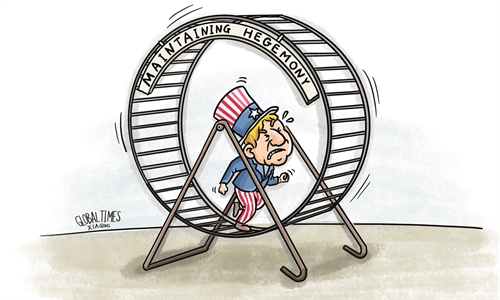
Illustration: Liu Rui/Global Times
Multipolar organizations such as BRICS and the SCO have begun to play a greater role in the global systemic transition over the past decade, which has challenged the dominance of Western-centric ones like the G7 and NATO over international relations. Some observers have naturally taken to comparing each economic and security pair, BRICS versus the G7, and the SCO versus NATO, respectively, but such conclusions are often misleading since these groups are actually quite different from one another.
BRICS comprises emerging economies, while the G7 concerns developed ones, with the distinction between the two being more clear-cut nowadays after Russia left the latter following its suspension. The first is geographically diverse, while the second is geographically concentrated in the Atlantic, with the exception of Japan. Additionally, the BRICS countries are trying to improve intra-organizational trade and investment, whereas the G7 already has plenty of this between its members.
As for the SCO and NATO, the first doesn't include mutual defense commitments, while the second was founded around this concept. No country leads the SCO, whereas the US is the unofficial leader of NATO. The preceding observation bolsters the former's claim of sincerely respecting its members' international legal status as equals, while the latter's informal hierarchy betrays this principle. On a sensitive note, some SCO states are embroiled in serious disputes, unlike most NATO ones except Greece and Turkey.
If one takes the above comparisons at face value, then they might be inclined to think that Western-centric organizations are more united and, therefore, ultimately more effective than multipolar ones, thus leading to pessimism about the prior mentioned future prospects. That's arguably an inaccurate conclusion, however, since it overlooks the fact that these same differences between them are actually a benefit for multipolar organizations instead of the detriment that some are misled to believe they are.
Casual comparisons tend to overlook the BRICS countries' shared goal of accelerating financial multipolarity, which accounts for its geographic diversity as well as its intent to improve intra-organizational trade and investment. This group never harbored any geopolitical aspirations but has always been motivated by geo-economic ones. In pursuit of their goal, they're using national currencies in more of their transactions while simultaneously exploring the possibility of a new reserve currency.
Details about this project remain scant, but reports suggest that it could involve a combination of commodities like gold and a basket of their national currencies. It is premature to speculate on it beyond that, but the importance in referencing this in the first place is to reaffirm their commitment to accelerating financial multipolarity, which is enhanced by their geographic diversity that some casual observers have been misled by false comparisons of BRICS to the G7 into thinking it is a detriment.
On the subject of the SCO, its lack of mutual defense commitments preserves each member's strategic autonomy instead of subjugating them to a hegemonic order, as is the case when it comes to the NATO countries' relations with the US. Far from seeking to counterbalance NATO, which has never been the group's motivation, the SCO's coordination mechanisms aim to enhance its members' capabilities to counteract the unconventional threats posed by terrorism, separatism, and extremism.
These three scourges collectively pose a challenge to each of their security, hence the importance of working closer together through intelligence sharing and other means to ensure stability in Eurasia. This noble goal explains why more countries want to become members, observers, and dialogue partners. Contemporary threats are increasingly connected to non-state actors who operate transnationally, not state-level ones who remain within their own borders, though those are also a problem, too, to be sure.
Upon more deeply analyzing the differences between multipolar and Western-centric organizations, it becomes clearer that their diametrically opposed worldviews are responsible for their defining features. Multipolar organizations respect the principles promulgated in the UN Charter regarding the true equality of countries, while Western-centric ones are striving to build a so-called "rules-based order" that's characterized by the US' hegemonic position atop the international hierarchy that it envisages.
With this in mind, it makes sense why BRICS focuses on accelerating financial multipolarity while the SCO concentrates on thwarting unconventional security threats. By contrast, the G7 is driven by the desire to retain the West's financial dominance while NATO continues creating state-level threats for others.
Multipolar organizations are motivated by mutually beneficial outcomes that don't pose any threat to third-parties' legitimate interests, whereas Western-centric ones are motivated by zero-sum outcomes that threaten others' legitimate interests by their very nature. This philosophical difference accounts for everything else that sets them apart from one another, which casual comparisons often overlook, hence the need for deeper analyses in order to appreciate multipolar organizations' competitive advantage.
The author is a Moscow-based American political analyst. opinion@globaltimes.com.cn

